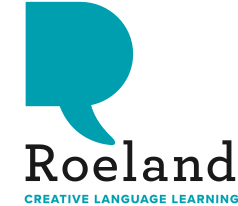Interview experts didactics - Picking up a language in a creative fashion: that is how we do it at the camp!
The motto of Roeland is “Creatively learning languages”. But what does that mean? And how is this adage being put into practice? We ask Pauline De Baets, Vice General Coordinator, and Tom Vandevelde, Head of Didactics. Together they set out the didactic course at Roeland.
Immersion: effective use of communication in the target language.
When you have Roeland in mind, you think about immersion. Why this method?
Pauline: “Our immersive angle proved its effectiveness, for more than 52 years now. In comparison to a normal week at school, we involve our students actively by submerging them in the language of their choice for the duration of the camp.
Tom: “The exercises are linked to specific situations, so that our students can use their newfound knowledge straight away. A language workshop about vegetables and fruits is usually followed by a visit to a grocery store, where the participants pick and buy whatever ingredients they need for dinner preparation.”
Pauline: “Or, at the start of the day, they learn the necessary vocabulary to join and play a big game later that day. I can assure you: there is no lack of motivation there!”
Can such an approach be too intimidating sometimes?
Pauline: “We do everything we can to keep the treshold for speaking in a new language as low as possible. We provide a logic trajectory, starting with ‘initiation’ camps, all the way up to ‘experience’ camps. At Junior camp (age 9-12) en at some of our Teen camps (age 12–14) the children are allowed to speak to one another in their own language. We organise the rest of our camps (for children above 12) in accordance with the immersion method.
Tom: “Our teachers are often native speakers, so our youngsters have practically no other option than to speak the language they signed up for. And that is what it’s all about: making mistakes is very much allowed, you just must keep trying! The teachers use only the target language and do whatever they can to help our students find the right words. After a language camp our participants often think or dream in French or in English. This can only mean one thing: mission accomplished!”
Pauline: “The focus of our specific language workshops evolves together with age groups and language level, to bigger overarching projects. Our +15 group in Chémilly cooks, lives, and discusses topics in a charming vacation house; the +16 camp from ‘Langley on Stage’ rehearses a beautiful stage play for the local people, and the +14 students take to the water at Osmington Bay.”
Learning in a playful manner.
Tom: “And now it’s about time we show the ace up our sleeve: a playful approach. Our students go about the language amusingly, but these fun and games are supported by a well thought out and scientifically sound method. Expanding someone’s vocabulary can just as well be achieved by letting teams engage in vocabulary-enriching games like ‘Time’s Up!’. A little spark of competition kindles motivation, and you can rest assured: our students leave the camps with an expanded vocabulary. For example: we design escape rooms where spelling and grammar are the keys to get out, our participants write and fine-tune dedicated songs, they solve a Cluedo mystery from a multilingual angle, and so on...
Pauline: “...and stories are not just being told: our students turn these tales into small stage plays for which they write the script, design the costumes, and create the set pieces.
You’re obviously aiming high. How do the teachers deal with this kind of expectation?
Tom: “Believe it or not, but they are the ones urging us to do so. A lot of our volunteers are professional language teachers. In the course of a year, we organise multiple training workshops for our teachers, all moments of opportunity to brainstorm and look at our teaching objectives from a fresh angle. It’s a perfect way to pick up all kinds of inspiration, for our camps but also for their professional occupation.
Optimised for our students.
Pauline: “We also prefer a high student-teacher ratio. For every five students we provide one teacher. That is why we firmly believe in Roeland’s uniqueness. The teachers mingle with the students and engage in conversation. It’s a proven way to forge a bond of trust between the students and the teachers, and a perfect environment for honing newfound language skills.
Tom: “The teachers get to know the youngsters well with a relaxed vibe as a result, so the students feel more at ease to speak freely. Our language workshops consist of a small number of participants to guarantee a personal approach, tailored to the students’ needs. The teachers interact with the children based on their knowledge of the target language, their talents, and preferences. For example: we organise camps where the youngsters take turns having a say about how the day will look like. That sounds great, doesn’t it?
